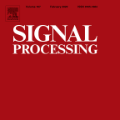Multi-channel sparse blind deconvolution, or convolutional sparse coding, refers to the problem of learning an unknown filter by observing its circulant convolutions with multiple input signals that are sparse. This problem finds numerous applications in signal processing, computer vision, and inverse problems. However, it is challenging to learn the filter efficiently due to the bilinear structure of the observations with the respect to the unknown filter and inputs, as well as the sparsity constraint. In this paper, we propose a novel approach based on nonconvex optimization over the sphere manifold by minimizing a smooth surrogate of the sparsity-promoting loss function. It is demonstrated that manifold gradient descent with random initializations will provably recover the filter, up to scaling and shift ambiguity, as soon as the number of observations is sufficiently large under an appropriate random data model. Numerical experiments are provided to illustrate the performance of the proposed method with comparisons to existing ones.
翻译:多渠道分散的盲分分解或革命性稀释编码,是指通过观察其循环加速变异的多输入信号而发现一个未知过滤器的问题。这个问题在信号处理、计算机视觉和反面问题中发现许多应用。然而,由于对未知过滤器和输入物的观测存在双线结构,以及空间限制,因此要有效地了解过滤器是困难的。在本文中,我们提议一种基于对球体方块进行非电解分流优化的新办法,最大限度地减少宽度刺激损失功能的平稳替代装置。事实证明,随机初始化的多梯度梯度下降将可快速恢复过滤器,直至在适当的随机数据模型下观测数量足够大的情况下,逐步扩大和改变模糊度。提供了数字实验,以说明与现有数据进行比较的拟议方法的性能。



